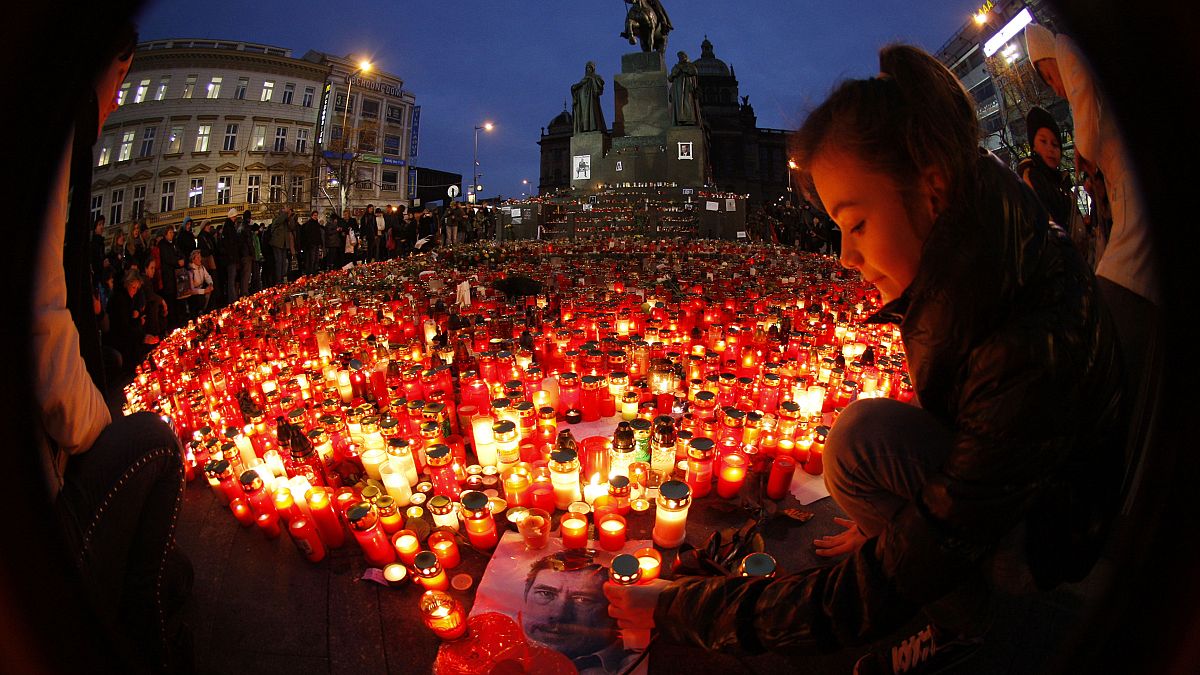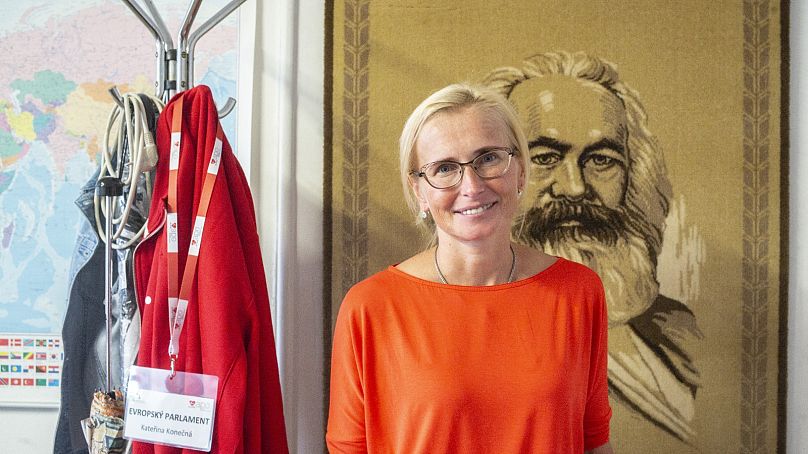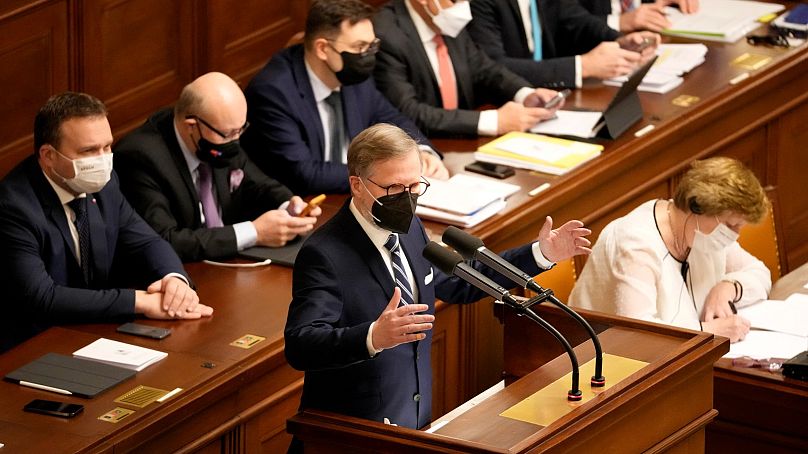The communists and social democrats failed to win any seats at the last Czech election. Where do they go from here?
Busts of Karl Marx and communist-era propaganda posters dominate the rather austere surroundings.
The walls could also do with a lick of paint.
Even the most ardent communist would admit the party's headquarters in central Prague have seen better days.
Which is all a convenient metaphor for Czech communism: like its offices, the party has seen better days.
The Communist Party of Bohemia and Moravia (KSČM) failed to win seats in parliament for the first time in its history at last October’s parliamentary election.
Since political parties are given state money for every MP they have in parliament -- now zero for the communists -- the coffers are emptier than normal.
In the early 2010s, the KSČM was one of the three main political parties in the country, commanding nearly 15 per cent of the vote.
Last October, it fell to around 3 per cent.
Nonetheless, Kateřina Konečná, an MEP who became party leader in the wake of the election defeat last year, is optimistic they can mount a comeback.
“If I wasn’t an optimist, I wouldn’t be sitting here,” she told Euronews.
Left-wing collapse
She has an uphill struggle: last October’s general election was a rout for left-wing parties.
The Social Democrats (ČSSD), another major political force after the Czech Republic was founded in 1993, also failed to win seats in parliament for the first time in their history, picking up just 4.65 per cent of the vote.
The Green Party again performed badly, gaining less than 1 per cent of the vote.
Even the progressive Pirates, now one of the five parties that make up the new coalition government, won just four of its electoral alliance’s 37 seats. It went from having the third-biggest number of MPs in parliament after the 2017 ballot to now the smallest.
Analysts point to some domestic explanations for the collapse of left-wing parties. Both the ČSSD and KSČM were tainted by association with former prime minister Andrej Babiš, one of the country’s richest men. The ČSSD was in a formal coalition with ANO, Babiš’ populist party, and KSČM supported the former government informally in parliament.
But ANO claimed all the credit for the government’s generous welfare expenditure, siphoning off the voters from the left-wing parties, explained Filip Kostelka, a professor at the European University Institute.
As a result, ANO won 72 seats in the Chamber of Deputies last year, making it the largest party in parliament.
The Social Democrats had been internally split for years, mostly because of the decision of Jan Hamáček, who led the party into last October’s ballot, to cooperate with Babiš in 2018. Hamáček survived a leadership challenge just months ahead of the election but resigned last October.
Corruption allegations tainted both parties as well as finances. The KSČM spent nearly €1.3 million on its campaign for last October's election, about a third of what Babiš’s ANO splurged, according to party finances disclosures to parliament.
The ČSSD had a little more money (€2.3 million) but that was nearly half the victorious SPOLU electoral alliance’s outlay.
More worrying are demographics: the average age of KSČM supporters is around 80, says Lubomír Kopeček, a political science professor at Masaryk University, and it is struggling to attract younger voters.
The ČSSD’s voter base has also winnowed to mainly the elderly in rural areas. That has meant both parties found it difficult to adapt to changing demands of the wider voting public, analysts say.
Following a trend?
Sean Hanley, an associate professor in Central and Eastern European politics at University College London, argues that the electoral collapse of left-wing parties in the Czech Republic is representative of the obvious fall of the political left across Europe during the 2010s.
The French Socialist Party used to routinely be in government but fell to only the fourth-biggest group in the National Assembly after 2017. The Dutch Labour Party went from 42 MPs in 2003 to now just nine. The British Labour Party remains in the doldrums, suffering its worst electoral defeat in 84 years at the 2019 general election.
This European trend even has a name: “Pasokification”, a reference to the collapse of the Greek centre-left party PASOK.
Analysts have many theories as to why. It’s down to the hollowing out of working-class communities, according to some, or lingering blame for many of the centre-left parties that were in power during the 2008 financial crisis. Social class and economic policy have become less important to voters.
Hanley, of University College London, says that socio-economic issues haven’t gone away as key issues for voters, but only have appeal when “packaged up” with other cultural issues, like migration and corruption.
This was a formula used successfully by Babiš, whose election campaign last year focused on two issues.
First, his government had increased pensions and state welfare payments. Second, his government was against increased migration. He even invited Hungarian Prime Minister Viktor Orbán, a champion of European anti-immigration politics, to speak on his campaign trail just days before the election.
Czech left-wing parties realise they have to adapt and can no longer just campaign on economic policy.
Communist leader Konečná stressed that her party is unique in its foreign policy agenda: it wants to pull the Czech Republic out of the NATO alliance and offer a referendum on EU membership.
Michal Šmarda, who became president of ČSSD after last October’s election defeat, said the party plans to make a “restart” with its new leadership. That includes its new vice-president Tomáš Petříček, the country’s former foreign minister who attempted a leadership challenge within the party last year.
“It is not that the left-wing issues and left-wing voters will disappear overnight. These are people living here, these are issues still relevant for our society,” Šmarda told Euronews by email.
Konečná stresses that those issues will grow even more important in the coming years, especially as the new coalition government of Prime Minister Petr Fiala plans to push ahead with “rightist” policies.
Babiš has vowed to be the defender of left-wing values in parliament, where his ANO party is the main largest opposition group, but Konečná doubts that.
“In some aspects, he will be promoting left-wing or social issues,” she said, “but generally his policies will never be the left policies and his party will never become the [main] left-wing political party.”
Instead, she argued, there needs to be a proper left-wing voice in Czech politics.
Fiala vows to balance the budget, after blaming his predecessor Babiš for running up the country’s debts, and his government is likely to hit welfare benefits and social spending. His pro-Western foreign policy will likely frustrate many left-wing voters.
“There is a large block of Czech voters on the economic centre-left and moderately cultural conservative who are likely to find the coming years tough,” Hanley said.
What can the Czech left learn from elsewhere in Europe?
If what has happened in the rest of Europe points to some answers for the collapse of the Czech left-wing parties, they might also learn something from abroad.
Kostelka, of the European University Institute, reckons an ambitious left-wing politician could launch a new left-wing platform in the Czech Republic, something similar to what happened in Slovakia in the early 2000s.
In 2005, the politician Robert Fico began to merge many of rump left-wing parties in an expanded Direction – Social Democracy (SMER) party, while also switching towards a more centrist and populist outlook. SMER won Slovakia’s 2006 general election, while Fico was prime minister for ten of the next 12 years.
“Making alliances is the way forward,” said Šmarda, the ČSSD leader. “The unification of democratic left, as well as left-leaning parts of Czech civil society, is definitely the way to get Czech Social Democracy back into the Chamber of Deputies,” he said, adding that Czech left-wing parties were behind the times in this respect.
Early last year, many of the country’s centrist or centre-right parties formed electoral alliances.
The Civic Democratic Party (ODS), Christian Democrats (KDU-ČSL) and TOP 09 created the SPOLU (“Together”) alliance that won 71 of the 200 seats in the Chamber of Deputies. Afterwards, it agreed to a coalition government deal with another electoral alliance, composed of the Pirate Party and the centrist Mayors and Independents (STAN). Fiala, the new Czech prime minister who took office in late November, is head of SPOLU.
“The right has united its forces and won. Unfortunately, this is not the case with the left,” said Konečná.
While she rules out any unification of the left-wing groups into one larger party, she agrees that an electoral alliance, possibly with the ČSSD and some smaller groups, is the way forward.
The big test, she argued, will come at municipal elections later this year, when she reckons the left-wing parties could form an informal partnership to run with joint candidates or back out of certain municipalities if the other party fields a stronger candidate. She also expects the left-wing parties to agree on a single candidate for next year’s presidential election.
It's at these two elections where “we will see how the left in the Czech Republic will be able to unite,” she said.
Every weekday, Uncovering Europe brings you a European story that goes beyond the headlines. Download the Euronews app to get a daily alert for this and other breaking news notifications. It's available on Apple and Android devices.


